


|
Joined:
|
26/05/2015 |
|---|---|
|
Last Updated:
|
09/01/2016 |
|
Location:
|
Phoenixville, PA, United States |
|
Climate Zone:
|
Cool Temperate |
|
Gender:
|
Male |
|
Web site:
|
www.permscape.com/ |
(projects i'm involved in)
(projects i'm following)
Back to John Stevenson's profile
Posted by John Stevenson about 9 years ago
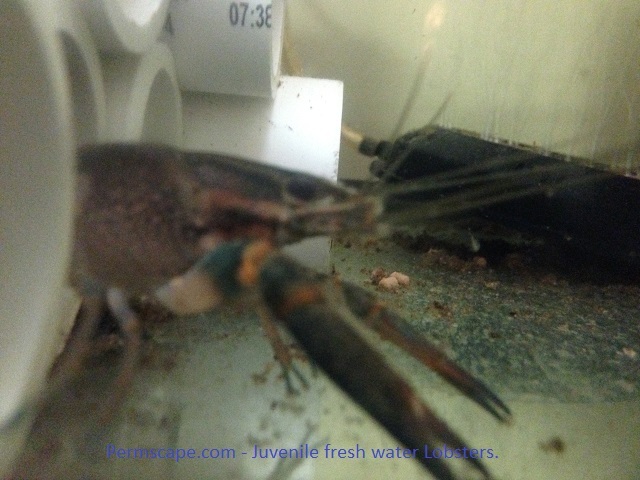
We continue raising Red Claw (Cherax Quadricarinatus) fresh water lobsters in our closed loop Aquaculture/Aquaponics system Pennsylvania research project.
We started with 25 juvenile freshwater lobsters several years ago. We attempted to raise most of them together in an aquarium tank of approximately 170 gallons. A smaller group of 3 (three) were placed in a 25-gallon tank. A group of 2 (two) were put into a ten-gallon tank. PVC pipe pieces were placed in each of the tanks to provide cover and decrease stress. The lobsters were fed pellets, algae, fruit, culled fish, and vegetable scraps.
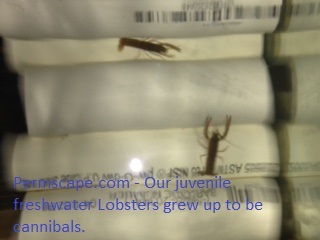
Our Cherax were extremely cannibalistic. They decimated the original colony.
The lessons we learned were very valuable.
Proactive management is necessary:
1) Maintain a regular feeding cycle - When fed sufficiently, the lobsters opt for a presented meal rather than hunting each other.
2) Separate based on size - Remove faster growing lobsters and sort them in tanks based on size. Large lobsters tend to prey on the much smaller ones.
3) Quarantine molting lobsters - A molding lobster makes an easy prey.
4) Pay attention to the glare glands. They will tell you when it is safe to introduce a breeding colony.
5) Provide the maximum surface area possible. Consider both horizontal and vertical surfaces.
6) Cherax will escape if you don't prevent it. They will climb up filters, air hoses, nearly anything you could think of. Cover your tank or aquaculture system with some barrier to keep them from escaping.
Research partners of ours have been quite successful over the years raising and breeding Red Claws in New Jersey. We anticipate a greater collaboration with our friends doing this great work during the winter of 2017. 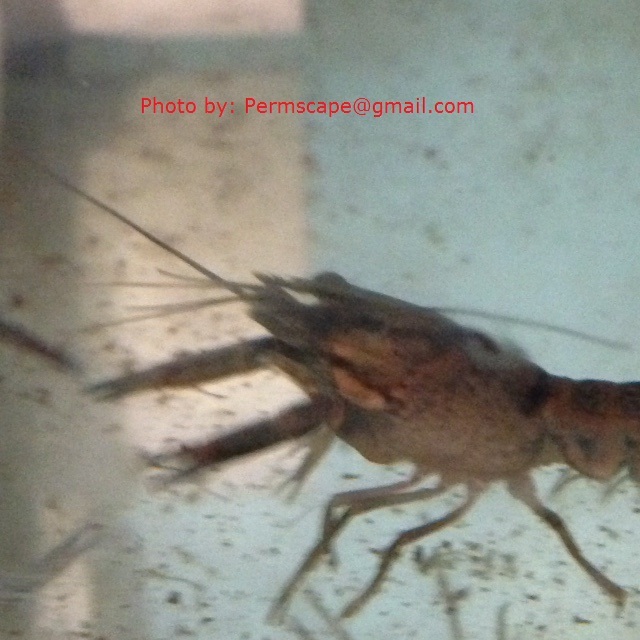
We made a home for the surviving Cherax in our system. Our main focus is on the indoor garage/basement Aquaponics System. We are using the system byproducts to fertigate our permaculture food forests. The indoor systems are designed to demonstrate how simple it is to grow fish and vegetables in a Pennsylvania, U.S.A. climate. 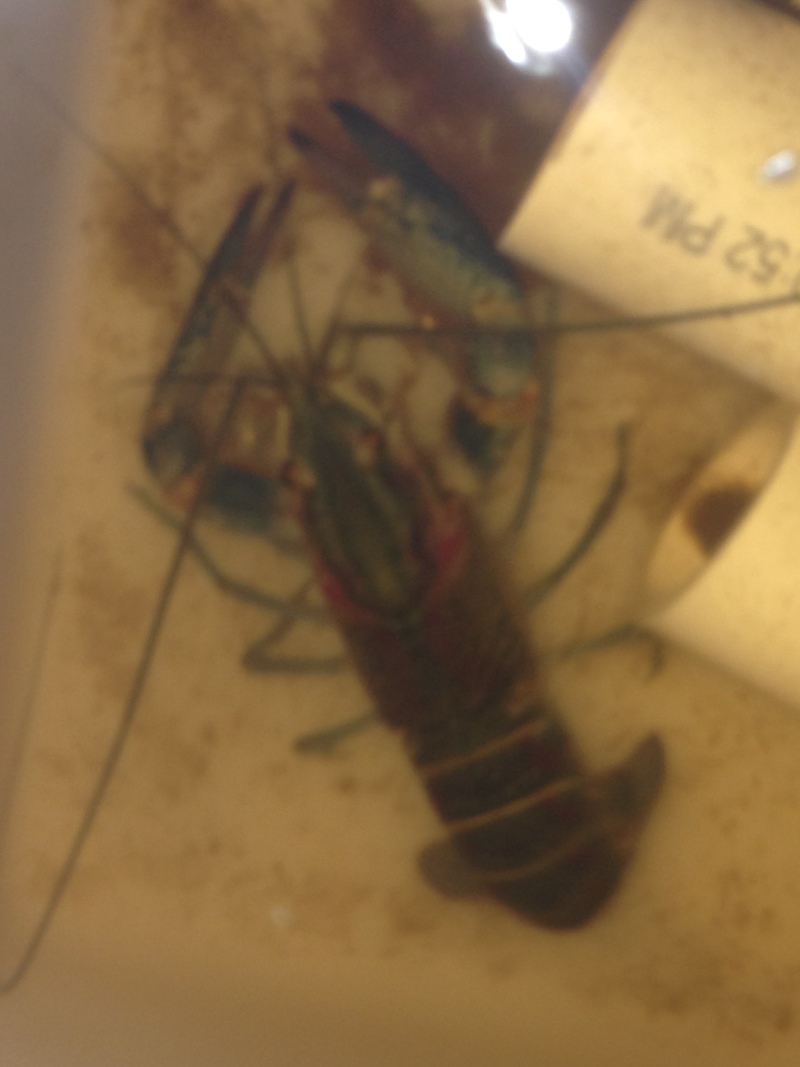
We don’t appreciate slackers. Our Red Claw Lobsters have to work for their dinner. We placed one in each sump tank. The aquaponics grow beds dump water into the sump tanks below. This process oxygenates the water.
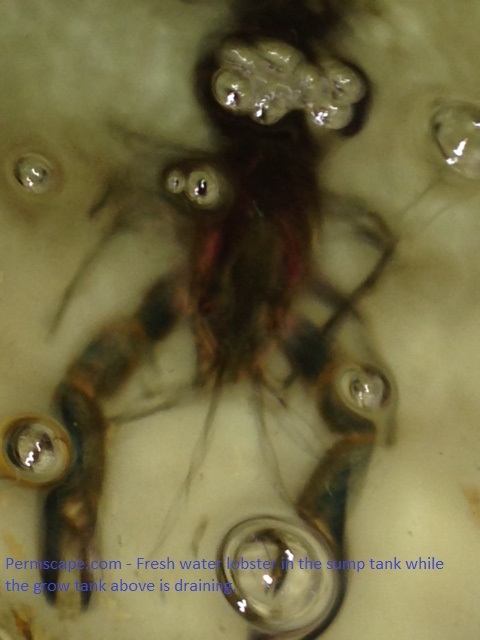
This results in an occasional deposit of debris from the plants above. The Red Claws eat the detritus which settles into the tank. They are our secondary system cleaners. The Cherax scavenge much as they do in nature. (Pictured below is Mr.Pinchy).
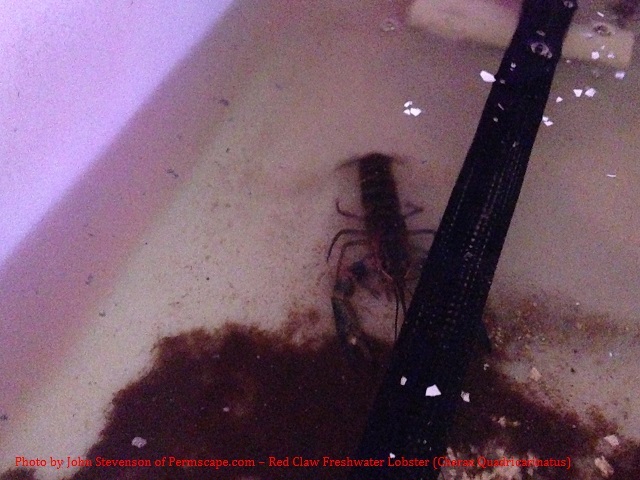
The water flows out of the back of the sump tank into a separate tank housing the electric sump pump. Recycled water is sent back to the fish tank. It also flows into the beds above. One pump moves all the water in a constant loop. Nutrient rich water feeds the plants and lobsters while cleaning the water for the fish much like a mini ecosystem.
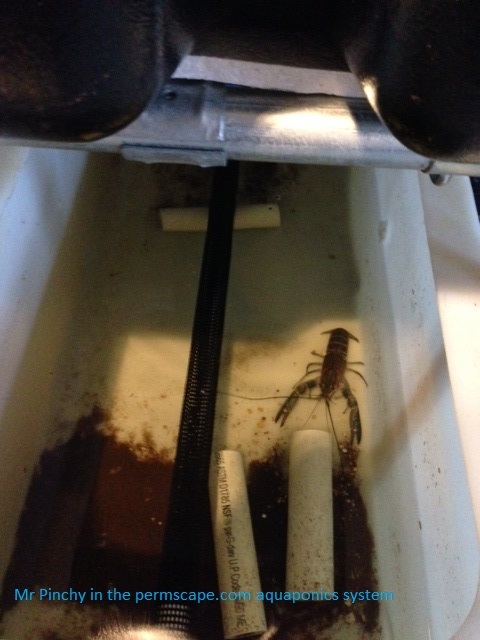
If you are willing to invest the time observing and managing the needs of your Red Claw lobsters, you will be adding an excellent synergetic component to your system.
We planned on optimizing Red Claw grow out through maximized feeding in dense culture tanks. Our pellet formula made from worms, insects, plants, and small fish (raised in our system) was to be fed using a timer to keep the urge for cannibalistic behavior to a minimum.
Pick up the torch! Continue this work from your home.
It occurs to me that frequent manual feeding (using live foods) could prove equally effective and be sustainable on a small scale. Let us know if you try it. The link below may help get you started:
http://www.fao.org/fishery/culturedspecies/Cherax_quadricarinatus/en
You must be logged in to comment.

| Permaculture Design Course 2015 |
| Type: Permaculture Design Certificate (PDC) course |
| Verifying teacher: Salah Hammad |
| Other Teachers: Geoff Lawton |
| Location: On-Line |
| Date: Feb 2015 |

| Geoff Lawton |
| Type: Geoff Lawton Online PDC |
| Teacher: Geoff Lawton |
| Location: Online |
| Date: Feb 2015 |

| Geoff Lawton |
| Type: Geoff Lawton Online Earthworks |
| Teacher: Geoff Lawton |
| Location: Online |
| Date: Feb 2015 |

| Geoff Lawton |
| Type: Geoff Lawton Reading the Landscape |
| Teacher: Geoff Lawton |
| Location: Online |
| Date: Feb 2015 |
| 2 PDC Graduates (list) |
| 0 PRI PDC Graduates (list) |
| 0 Other Course Graduates (list) |
| have acknowledged being taught by John Stevenson |
| 0 have not yet been verified (list) |
| John Stevenson has permaculture experience in: |
|---|
| Cold Temperate |
| Cool Temperate |